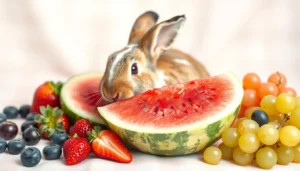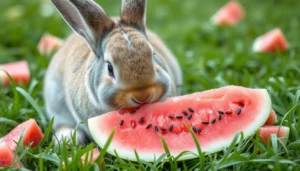If you are here to know is watermelon safe and healthy tasty food for rabbits? You are at the right place. It is very necessary to provide a balanced and nutritious diet including veggies and fruits. In this article, I pick your question ”Can rabbits eat watermelon?” and discover that juicy food or fruit like watermelon is a good diet for your fluffy bunny friend.
Can Rabbits Eat Watermelon? Is It Good For Rabbit Health?
Watermelon is a fruit that comes in summer and is loved by humans because of its refreshing and hydrating nature. But what about your furry friend? Is it safe for your pet rabbits to eat?
Simply Yes rabbits can eat watermelon.
You can give watermelon to your rabbits as a treat. Watermelon is a juicy fruit that can be a delicious and hydrating addition to a rabbit’s diet. Watermelon contains a high water content that keeps your rabbit hydrated in the summer season.

It’s important to keep in mind that watermelon should only be given as an occasional treat. It is not a regular diet for rabbits. However, fruit is not a natural part of a rabbit’s diet and this may cause some health and digestive problems. Their diet should primarily consist of hay, fresh vegetables, and a limited amount of fruit.
What About Watermelon Rind?
It is recommended to remove the rind from the watermelon before offering it to rabbits. The rind is hard to consume and causes a problem for the bunny to digest it. It is great to remove the rind before offering watermelon.
Nutrition Facts for Watermelon
USDA research tells us watermelon is a very nutritionally absent fruit. It contains only water and sugar. If we remove its water its calorie content is entirely carbohydrates, protein, and fat and there is no content of minerals to say it is very well juicy and watery fruit.
Health Benefits and Dangers of Watermelon for Rabbits
Watermelon has no such health benefits for rabbits. It is comparatively low in nutrient content and high in sugar which makes it treat base food for rabbits. you can give it to your rabbits infrequently and skip it.

How to Feed Your Watermelon to Your Rabbits
Always choose fresh and organic watermelon to offer your rabbit. It is important to follow the guidelines to keep your rabbits safe and sound.
- Moderation is Key: You can give watermelon to your rabbits but in moderate quantity. It is not a part of the regular diet of rabbits. Offer a small size piece to prevent overconsumption.
- Wash properly: Wash the watermelon properly before offering it to your rabbit to prevent any kind of germs, dirt, pesticides, or chemicals that may present on the surface of the watermelon.
- Remove Seeds: Seeds of watermelon may be harmful to rabbit health. So it is recommended to remove the seed before offering it to your fluffy rabbit. It is important to remove the seed to prevent any digestion issues with rabbits.
- Monitor Digestive Response: It is important to monitor the digestive response of rabbits after giving the watermelon. If you notice any discomfort, such as diarrhea or bloating discontinue feeding watermelon and consult a veterinarian.
Other Treats To Give Your Rabbits
You should offer different fruit and veggie treats to your rabbits. Here are some great treats for your bunnies friends:
The Importance of a Balanced Diet
Watermelon can be a refreshing treat for rabbits but it is important to provide a balanced diet that fulfills their nutritional requirements. The primary component of their diet should be depending on vegetables and some fruits.
Conclusion
Fruits are not an essential part of wild rabbit’s diets aspect some fruits. Watermelon should be given to rabbits to eat but only as a treat. Remember to remove the rind and seed and provide a small bite-sized piece to prevent any digestion issues.
If you have any questions about your rabbit’s diet, it’s best to consult with a veterinarian. They can provide the best personalized advice based on your rabbit’s needs and health conditions.
Thank you for reading! I hope this guide tells you everything you want to know about whether rabbits can eat watermelon. See our other article on strawberries and berries as well.

